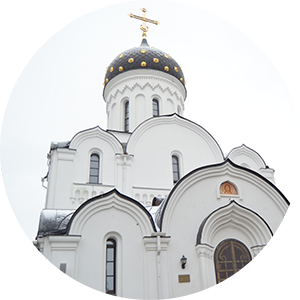Thanksgiving Day has a very significant role in American families
because it is one of the few times a year that the family gets together.
Thanksgiving Day is also called a Turkey day because it usually involves a meal
with turkey or at least a more elaborate meal. Most American Orthodox
Christians started the Nativity Fast on November, 15. How can an Orthodox
Christian navigate these family gatherings, often with family who are not
Orthodox, and still keep the Nativity fast?
Fr. Panayiotis Papageorgiou, Holy Transfiguration
Greek Orthodox Church, Marietta, Georgia
 Thanksgiving
for Americans is a family event. The roots of the feast are found in the
inclination of the human heart to offer thanks to God for the abundance of
blessings He has bestowed upon us. Theologically speaking this feast is an
extension of the Divine Liturgy - the Holy Eucharist (in Greek
Eucharistia=thanksgiving).
Thanksgiving
for Americans is a family event. The roots of the feast are found in the
inclination of the human heart to offer thanks to God for the abundance of
blessings He has bestowed upon us. Theologically speaking this feast is an
extension of the Divine Liturgy - the Holy Eucharist (in Greek
Eucharistia=thanksgiving).
As Orthodox
Christians, who value the unity and strength of the family, we are inclined to
adopt this feast as our own, especially at a time when the institution of the
family is under attack from all directions. Considering the traditional
Thanksgiving meal, however, which involves turkey, ham and dairy products,
Orthodox Christians trying to hold the fast of Christmas are faced with the
dilemma: Should I hold the fast and go contrary to the established social and
cultural norms associated with Thanksgiving Day or should I break the fast in
order to facilitate the need of blending in and not making others uncomfortable
with my presence?
Several years
ago, responding to the request of the faithful under its jurisdiction in
America, the Patriarchate of Constantinople applying "economia"
discreetly granted its blessing for those who live in America to break the fast
on Thanksgiving Day while focusing on the unity of the family and the "eucharistic"
aspects of this feast, but quickly return to the observance of the fast
immediately afterwards. The non-Orthdox cultural norm is thus transformed
through our theology and this pastoral approach to a positive element for the
strengthening of family bonds, while keeping with the necessity of our
spiritual ascesis of fasting.
Fr. Sergei Sveshnikov, rector of the Holy New Martyrs
and Confessors of Russian church in Mulino, Oregon
 This question
rarely troubles those who keep the Julian calendar, as is the case in the
Russian Orthodox Church, since our Nativity Fast begins on November 28. However, some years, Thanksgiving does land
on November 28--the first day of our Nativity Fast. I can see two approaches to resolving the
conflict between fasting rules and a Thanksgiving turkey.
This question
rarely troubles those who keep the Julian calendar, as is the case in the
Russian Orthodox Church, since our Nativity Fast begins on November 28. However, some years, Thanksgiving does land
on November 28--the first day of our Nativity Fast. I can see two approaches to resolving the
conflict between fasting rules and a Thanksgiving turkey.
First, in my
opinion, there would be nothing wrong if diocesan authorities or even parish
rectors chose to relax some fasting rules on this day, especially in those
parishes which are composed of mostly American converts to Orthodoxy, who not
only have many non-Orthodox family members, but have grown up with the
tradition of celebrating Thanksgiving in a certain way. Perhaps, a token morsel of turkey and a
symbolic piece of pie with a heartfelt prayer to God, thanking Him for His
boundless mercies to us, is a better witness to Orthodoxy than a senseless
discussion among non-Orthodox family members of which foods are allowed and
which are not. A true fast is much more
than food. An Orthodox Christian would
do well abstaining from gossip, back-biting, and judging, as well as gluttony,
drunkenness, and other sins and passions which may find for themselves fertile
soil at the Thanksgiving table.
Second, keeping
a strict fast in America is rarely a problem at all. There are many Americans who do not eat turkey,
or pie, or mashed potatoes for any number of reasons--various health and
weight-loss diets, vegetarian and vegan convictions, and others. Most American families seem to have
absolutely no problem with someone declining one dish in favor of another and
having tofu instead of meat, salad instead of cake, or fruit instead of
ice-cream. Nobody seems to get offended
or upset, and Orthodox Christians should stop making belly-pleasing excuses for
why they cannot keep the fast.
One thing I
would absolutely discourage is for people to individually decide whether they
will keep the fast or relax it. Our
fasts are the common fasts of the whole Church; and we should fast as one body
or feast as one body. If our Christian
family is keeping a strict fast, then we must also keep a strict fast, even if
our biological family will not approve of this.
Of course, we must observe our fast will all gentleness, piety, and
discretion, without flashy advertisements of our self-righteousness.
Source: http://www.pravmir.com/article_1159.html
 |
| Help support the ministry of St. Elisabeth Convent |
















CONVERSATION